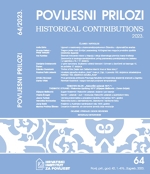Cesarčev Kvaternik: sin domovine između dvije revolucije
Cesarec's Kvaternik: A Son of the Homeland between Two Revolutions
Author(s): Marina Protrka ŠtimecSubject(s): Political history, Social history, Croatian Literature, Sociology of Literature
Published by: Hrvatski institut za povijest
Keywords: August Cesarec; Sin domovine [A Son of the Homeland]; Eugen Kvaternik; revolution; Youth movement;
Summary/Abstract: August Cesarec’s play Sin domovine [A Son of the Homeland] (1940) is founded in history and holds significance in literary history. The author’s introductory note highlights Eugen Kvaternik’s personal drama, which unfolds as a result of the clash between his mental makeup, ideals, and the social and political circumstances that ultimately lead him to carry out “the act” in the Rakovica Revolt, resulting in his tragic demise. Cesarec places Kvaternik alongside the idealists and revolutionaries of his time, contrasting him with the opportunism and corruption of the ruling political elite and the social structures that support them. In doing so, he creates the tragic figure of a historical personality through which he simultaneously reflects on the legacy of the French Revolution and the horizons of the October Revolution. This paper presents Cesarec’s approach as an expression of generational and personal engagement, which, in literary history, follows the tradition of deliberating on politics, justice, and resistance, as well as the limits of justified violence, progress, and historical destiny. This lineage can be traced in Croatian literature from Mažuranić and Kranjčević to the generation of the Young and Cesarec himself. In this context, Cesarec’s Sin domovine functions as a modernist formation of a drama centered around a prominent individual, whose individualism is a prerequisite for collective progress.
Journal: Povijesni prilozi
- Issue Year: 2023
- Issue No: 64
- Page Range: 413-427
- Page Count: 15
- Language: Croatian

